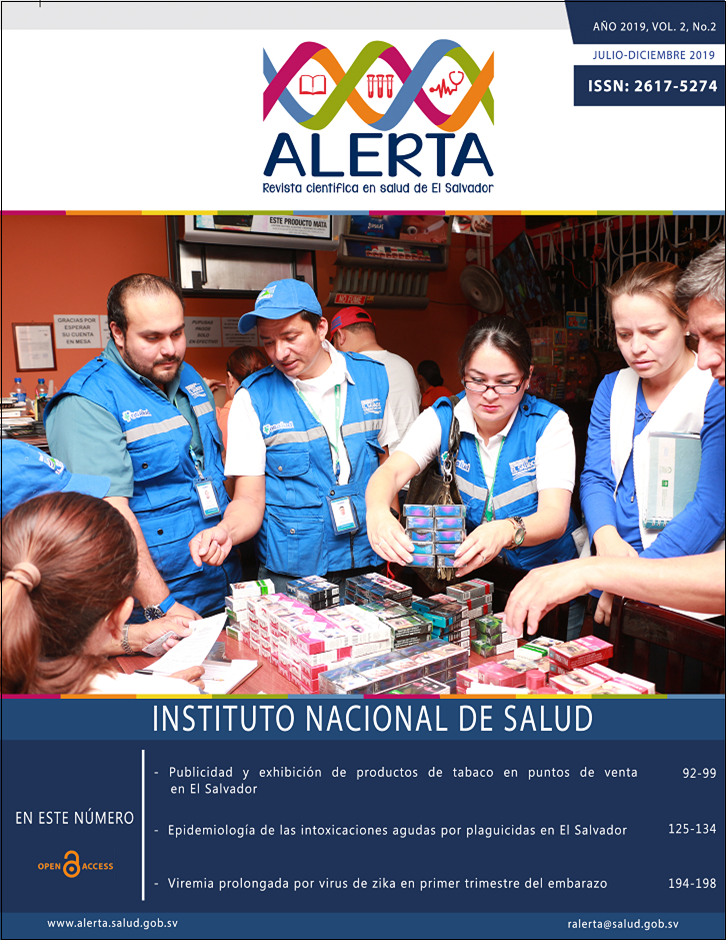Flora bacteriana en hospitales del Instituto Salvadoreño del Seguro Social, 2010-2017
DOI:
https://doi.org/10.5377/alerta.v2i2.7941Palabras clave:
flora bacteriana, infecciones hospitalarias, betalactamasas de espectro extendidoResumen
Objetivos. Definir la flora bacteriana aislada de infecciones hospitalarias y producción de betalactamasas de espectro extendido por enterobacterias entre el 2010 al 2017 en hospitales del Instituto salvadoreño del seguro social.
Metodología. Cuantitativo, descriptivo sobre bacterias aisladas de infecciones hospitalarias.
Resultados. Revisión de 79 693 reportes de los cuales 47 767 (60%) dieron positivos, la principal demanda fue de urocultivos: 31 788 (39.9% de la totalidad de cultivos) positivos en 45.2%, hemocultivos: 13 924 (17.5%) positivos 55.6%, cultivos de abscesos:12 362 (15.5%) positivos 86.2%, cultivo de secreciones respiratorias: 6 700 (8.4%) positivos 74.8%, macerados de herida quirúrgica: 2 153 (2.7%) positivos 88.9%. Predominó el hallazgo de bacterias Gram negativas: 33 130 (79% de todos los aislamientos) principalmente enterobacterias n=26 189 y bacilos no fermentadores n=6780, luego Gram positivos: 13 419 (28%) como estafilococos coagulasa positiva n=9 584 y 1970 catalasa negativa, en 1104 muestras (2.3%) se reportaron hongos y en 114 (0.2%) bacterias anaerobias (n=58). La bacteria más comúnmente encontrada fue Escherichia coli: 16 736 aislamientos (35% del total de aislamientos y 8.3% de cepas productoras de betalactamasas de espectro extendido), Estafilococo aureus: 6603 (13.8%), Pseudomona aeruginosa: 4 138 (8.7%), Klebsiella pneumoniae: 3955 (8.3%, cepas productoras de betalactamasas de espectro extendido: 4.4%) y Salmonella typhi: 1 498 (3.1%).
Conclusiones. Porcentaje de positividad de los cultivos: 60%, los estudios más solicitados: urocultivos, hemocultivos, y cultivos de abscesos, predominio de Gram negativos principalmente Escherichia coli, Pseudomona aeruginosa y Klebsiella pneumoniae, para Gram positivos fue Estafilococo aureus.
Descargas
1411
Descargas
Publicado
Cómo citar
Número
Sección
Licencia
Derechos de autor 2019 Víctor David Franco Escobar

Esta obra está bajo una licencia internacional Creative Commons Atribución 4.0.
Declaración de privacidad:
Los artículos de Revista Alerta están publicados bajo una licencia creative commons 4.0 CC BY: https://creativecommons.org/licenses/by/4.0/

Los autores conservan todos sus derechos sobre la obra y acuerdan permitir que los artículos sean copiados y distribuidos por cualquier medio, siempre que se mantenga su autoría y reconocimiento de la publicación, sin otras restricciones adicionales.




